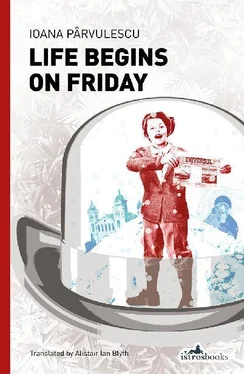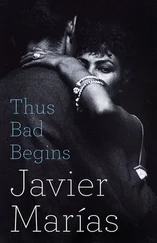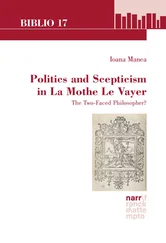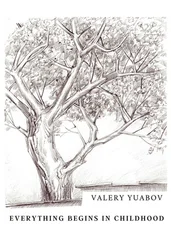‘A former mayor? It is hard to believe, although it is possible, because I have never seen public opinion so heated, not even when he was the one who decided to demolish the Sărindar Church. I can remember the dust I inhaled when I was on my way here, and the people from Adevĕrul , although their offices were in the Passage Vilacross, took the opportunity to turn it into a big scandal. But when I think that poor Lahovary was exactly the same age as I am, and when I remember what a decent and jolly man he was, I wish with all my soul that Filipescu be convicted.’
‘But why?’ said Pavel heatedly, his voice more irritated and louder than usual. ‘Don’t you have the right to send out your seconds when your name is blackened in a gazette? I’m not defending Filipescu, but in this case his honour was at stake. Lahovary was the one who attacked him. And he knew that he was striking at a man who was quick to anger.’
‘But you are forgetting how many attacks that Epoca , via its director Filipescu, made against George Lahovary and his newspaper?’ said the editor-in-chief, becoming upset. ‘So, one can wield a cudgel for a whole year without anything happening to him, but when the other gives him a slap, he challenges him to a duel! You force me to tell you what I believe: it was murder! Because to insist at all costs on duelling with a man who is not accustomed to it, and then, instead of dealing him a scratch, to plunge your sword in his belly, is what I call an assassination! Duelling is a mediaeval practice and I am surprised that a man of your sensitivity, a man with the soul of an artist, can approve of it.’
‘Don’t tell me, Mr Neculai, that you are one of those who agree with the outlawing of duels. Don’t tell me that you want to live in a world where anybody can mock you as he pleases and you will not have any weapon with which to protect your honour,’ said Pavel, his voice almost trembling with rage. It is possible that such an absurd situation will exist in the future, if such people get their way, but today at least, whatever other advantages we might lack, at least we have our honour.’
The atmosphere had become very tense, the same as it had been in parliament when the matter had been debated. The editor-in-chief rose from his desk and paced up and down with long strides. Pavel lit another cigarette, which only heightened his interlocutor’s annoyance.
‘And don’t forget what started it all,’ added Neculai Procopiu, without looking at him.
In a seemingly calmer tone, although they were still seething, they discussed the incidents on Strada Carol, which ultimately had started the avalanche, and tried to establish what had triggered them. Some gangs of ruffians, the dregs of Bucharest, professional thieves, ne’er-do-wells, had broken the windows of the shops on Strada Carol, most of them owned by Jews. The people of Bucharest had never witnessed the like since the robberies carried out by Melanos Bocceagiu and his vagabonds, whom they named the ‘kings of the Old Court.’ At Inger’s and Au Bon Goût they even broke glass partitions that were a centimetre thick, while at Dr Steinhart’s they broke only the windows. A few people had also been beaten-up. The newspapers had taken the side of the Jewish shop owners. The gendarmes chased the malefactors and made arrests. But here there was a small problem. Around Caton Lecca, also known as ‘the Elder,’ there floated the disgraceful suspicion that he closed his eyes to anti-Jewish manifestations. His brother from Buzău had been caught up in scandals of the same kind. But the professional probity of Costache Boerescu was, on the contrary, without visible blemish. People knew that the two got along like cat and dog. And it was said that Nicu Filipescu too was an anti-Semite, although later he had taken the side of the Jews. In his article Two Policies , Lahovary said that Nicu Filipescu was two-faced, that he wrote according to how the wind blew, and he recalled the affair involving Metropolitan Ghenadie. At this point, the argument almost erupted once more, and so the editor-in-chief saw fit to change the subject.
‘Have you seen that barbers and hairdressers are demanding that they be allowed to work on New Year’s Eve and Christmas Eve, because otherwise they will lose a large number of customers? And if they are not allowed to, they threaten to go on strike! Have you ever heard of a strike caused by not having the day off? Do you think that would make a front-page story?’
As he asked, Procopiu regarded Pavel with envy: he did not have such problems, when he was asked for a lead article, he found an up — to — date subject, such as the violin concert at the Palace of the Post Office that was relayed over the telephone. Oh, that interested Procopiu in the highest degree! It was as if you could be in two places at the same time, albeit via a single sense, the hearing. But very soon, so his inquisitive mind told him — the engineer in him, who also possessed the faculty of imagination — very soon we would be able to be in two places at once also via the eyesight, and then via the other senses, and, why not, in a hundred years, in two places at once bodily. It was here, in such news items, that the two men intersected, one arriving with science and hope, the other with fantasy and literature. Procopiu sighed and opened the window. In today’s paper, his article on the first page was about the young aristocrat who was slain, and the story about the Romanian torn to pieces by jaguars had been moved to the margin, although it ought to have had a central column, since the story was worthy of a novel. Beneath it, rather incongruously, was the following item: ‘DAILY ADVICE: A swollen cheek . Take a handful of elderberry flowers, another of camomile, and another of linden flowers, mix them well and place them in a sachet. Heat the sachet well and apply it to the swelling.’ He thought of Miss Margulis, whom he had just seen, because she had had the bizarre idea of visiting the newspaper offices, although her cheek was swollen, and he regretted not having had the chance to tell her about the advice in the Gazette. Who knows, maybe it worked? In fact, he did not have much faith in such advice and nor in the advertisements they were obliged to publish, advertisements for miraculous cure-alls, such as Genoa Water or remedies against the microbes that caused baldness.
‘Now that most young men wear moustaches rather than full beards, the barbers have had a lot of custom; they can’t cope. And nor is long hair the mode any longer,’ answered Pavel, in a placatory tone.
Somewhat mollified, since in that respect he could be reckoned a young man, Procopiu stroked his waxed black moustache.
‘But I for one preferred Mr Costache Boerescu with a beard rather than a moustache. Who knows for what prima donna he shaved off his beard.’
Pavel Mirto added, as a means of erasing the traces of the earlier argument: ‘Ah, but I have some more news for you. In France they have founded an all-female newspaper, La Fronde . Santa Maria, Madre di Dio! There’s a place I would like to work.’
‘As a smoker, I think you would have difficulties,’ said the editor-in-chief, with implied reproach. ‘What are we doing about tomorrow’s article, have you any ideas?’
Tuesday, 23 December: The Chance Occurence
Yesterday evening, Papa, only just having returned from Giurgiu, took fright when he heard that I had been outside in the cold all day, and so today he forbade me to go out of the house under any circumstances. ‘I shall call my friend Steinhart to examine you,’ he said. ‘As far as I can see, the infected molar is a wisdom tooth, and so it must be extracted. Wisdom teeth are good for nothing and cause only problems.’ ‘Wisdom likewise,’ I said, because I was feeling very gloomy. Let us think about it a little: I had every reason to be gloomy, since I still felt poorly, I still felt as if I had grit in my eyes, my cheek was still swollen, and I had dreamed of Alexandru. He had been duelling with Nicu Filipescu and both were wounded, and I was one of the seconds, the referee. But I could not help him, since I was not allowed. Of course, it could only be the result of the newspapers’ obsession with the Lahovary-Filipescu case, in other words the L’Indépendance versus Epoca case, in other words, a political querelle I do not believe that Nicu Filipescu killed him on purpose; as the servants say: he is notorious for his hot temper. But nor did he have any mercy on a man unaccustomed to swordplay. In a way, it was murder in the name of honour. Papa put Collir in my eyes; it did not hurt. Nor am I afraid of having my tooth extracted. Papa told me that nowadays there are methods of putting the tooth to sleep, they numb your jaw, and everything is painless, even if later, when the numbness passes, the pain returns. Papa praised me. He says that women are braver than men in the battle with illness. In the family on festive occasions they tell the story of how a colleague once asked Papa: ‘Mr Margulis, what is your opinion of the weaker sex?’ And Papa straight away replied: ‘I think that the weaker sex is the stronger sex.’ This saying then circulated, especially given that Papa is not renowned for bons mots . When I am ill, he always explains to me what has gone wrong inside me and after that I am not at all afraid; it seems to me that we are like mechanisms, which from time to time have to be repaired, oiled and adjusted. He told me that I have conjunctivitis and that both problems are probably because of a draught: ‘Did you keep the window open?’ he asked. He taught me that everything inside our head is connected; ears, nose and throat, and all the canals and nerves are inlets for the bad to enter. He speaks of the body; I speak of the soul. And then, Papa tells me: ‘ Mens sana in corpore sano , as Juvenal well put it, although he was a poet.’ He does not much like poets. And then: ‘A good doctor cures both mind and body.’ Let us see, Papa, whether you can cure my mind and body of Alexandru, I thought to myself, downcast.
Читать дальше












